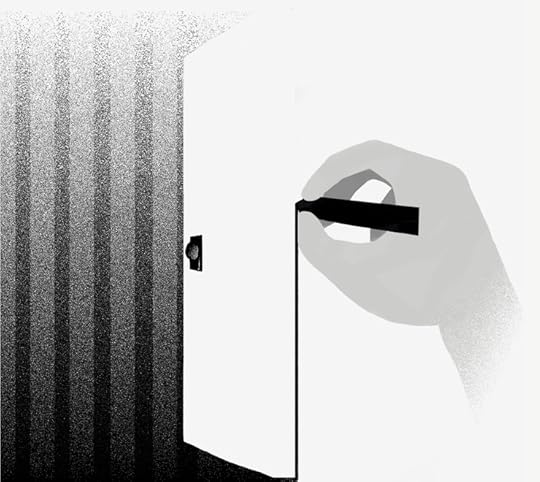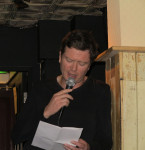Dermott Hayes's Blog: Postcard from a Pigeon, page 54
August 17, 2016
Signs of the Time#15
Roses & Silver Fountains
This story is dedicated to Fijay at Blog On! who inspired this fool’s midnight errand.
50 word story
Last night I set myself a Sisyphean dilemma, to find the origin and nature of the mysterious dot beside the moon. Now before you howl, ‘Perseid meteor shower’ and likely suspects, Venus, Mercury, Mars, Saturn and Jupiter, I’ll quote Shakespeare. About roses, silver fountains and clouds that stain the moon.




August 16, 2016
The genetic computer
You wouldn’t know your Google from the Giggles.
I find this post fascinating since I’ve been dabbling with science fiction recently and have tried to think of a way for human beings to access computer information without having to use a keyboard.
We live in a highly computerized society (the concept of the Internet of Things) where not only are there a lot of electronic devices abound, you probably have a computer on your person right now. Think of how many people in the world have a smartphone (surprisingly, I don’t – I’m just cheap). According to Experts Exchange, the guidance systems used in the Apollo missions have only twice the computing capability of the old Nintendo Entertainment System (or Famicom for you video game hipsters out there). That’s right – with half of the RAM that NASA used to guide Apollo 11 to the moon, I’ve been using it to save the Kingdom of Hyrule.

Source: Experts Exchange, http://pages.experts-exchange.com/processing-power-compared/
My old Sega Genesis (CPU Speed: 7.6 MHz, RAM: 72 KB) would have blown away the Apollo guidance systems. No contest.
All this computerization requires a lot of resources, especially silicon…
View original post 1,031 more words


Black Friday & the Red Scare
‘They’d rob the eyes out of your head and then complain you can’t see their point of view’.
D Hayes
By Daniel Margrain

The decision last Friday (August 12) by three Appeal Court judges to overturn High Court judge Hickinbottom’s determination four days earlier, ostensibly to prevent the right of 130,000 members to vote in the forthcoming Labour leadership election, is arguably among the most strangest of decisions to have been made in an English court. The five Labour members – Christine Evangelou, Edward Leir, Hannah Fordham, Chris Granger and an unnamed minor – who initially brought the case and whose legal fees were crowdfunded, had claimed that Labour’s rulebook made no provision for treating them differently and none had ever been made in any of the party’s previous leadership elections.
They also argued that when they joined, the Labour website and other communications said they would be ‘a key part of the team’, and thus eligible to vote in any leadership election as the graphic below illustrates:

Mr Justice Hickinbottom…
View original post 1,369 more words


The Ending -Daily Post prompt
COMMENTS, not just welcome, INVITED.
https://dailypost.wordpress.com/prompts/carry/

Failure is a hard and unforgiving mistress. But failure was what he did best. It was the only thing he was good at, you might say. Failure was his cross to carry.
No-one would have thanked you for saying it but the truth was a close relative of failure and occasionally they paid each other a visit.
But on this occasion he didn’t fail. He held the evidence in his hand, a copy of an obscure short story magazine and there in black and white was the title of his story with his byline beside it.
Alright, so it was a long time coming. But all the sweeter for that, he thought. He showed them. They who said he would amount to nothing. They who said he would never get published. They who said he was on a hiding to nothing, not a prayer or a snowball’s chance in Hell. ‘They’ and ‘them’, he thought, ‘well, fuck them.’
Privately, in a shadowed recess of his mind, he agreed with them enough to doubt the sanity or judgement of the editor involved. But such thoughts were not to be entertained today. He wanted to take a copy of the magazine and give one to all of his detractors. That was never going to happen. He couldn’t afford it.
But there were a few people he would love to rub their nose in his prose, he thought. Father McNamara, in particular, the sad old git of an English teacher who humiliated him in public before his classmates over a school essay. He blamed McNamara for his five year reluctance to write fiction, diverting his energies instead to the arcane pursuit of medieval academia.
McNamara was a pompous fool with loose dentures, too fond of his own voice. McNamara with the stentorian drawl of a southern congressman, all bloated with hot air, piss and vinegar. He enunciated his vowels, consonants and syllables with exaggerated length and volume and an inevitable shower of saliva on those unfortunate to be standing within a one metre radius of him.
The dentures, on that occasion, plonked onto David’s desk as McNamara, in full pompous verbal flight, was giving David’s prose an unusually vicious shredding, even by his standards.
Of course, this diatribe was accompanied by a harmonious chorus of sycophantic chuckles from those around him who were either relieved to avoid the old priest’s ire or simply made a point of chuckling derisively as a matter of form in such circumstances.
David weathered the storm. He braced himself against the pelting rain of mucous and the howling rage of the decrepit cleric’s fury. He was the new boy. It was expected and he faced it with the resolve not to betray himself by showing his fear.
Revulsion and anger were kept in check too…too tightly, as it turned out. He locked away his creative impulses and put virtual handcuffs on his imagination. He devoted himself to the pursuit of history.
And discovered quickly that history is written by the victors and not the vanquished. Or at least so the popular belief was held. But if a person could control the writing of their own history then there were no losers, only victims.
Carrying the cross of martyrdom was no heavy burden compared with the prospect of meeting expectations or disappointing anyone. It was easier to live in the twilight than die in the sun, he told himself.
But the cross becomes a crutch and the fear of failure becomes greater than the desire for success. He remembered being presented with a leather bound edition of Alexander Dumas’ The Three Musketeers for an essay he wrote about the legacy of the glorious rebellion of 1916. It was the 50th anniversary and he was just 10 and already precocious, if occasionally inattentive and distracted.
He prepared his essay for weeks, studied the history and the newspaper accounts of the jubilee celebrations. He knew of the boyhood’s fire in his blood as he read of those ancient heroes and their heroic but doomed struggle. He read Pearse’s oration at the grave of O’Donovan Rossa. He could recite the proclamation as proclaimed by Pearse and his motley band outside the GPO on that Easter Monday morning to a crowd who were less curious than derisive in the face of their idealism.
He remembered his father reading his essay with care on the night before the writing competition, how he read and re-read his prose. How he paced his bedroom anxiously, anticipating his father’s caveats and corrections. How his father presented him with an abridged version of his work, subtly altered. How this was what he memorised before he sat down with pen and paper to compose his award winning effort the next morning under supervised conditions in the schoolhouse.
He remembered now, sixteen years later, how cheap and hollow his victory felt as he received his copy of Dumas’ fiction.
Old McNamara, he thought, did him no harm. He just placed another obstacle in the way of his advance. If he believed in himself he could have fought and resisted.
‘Riiinnnng, riiiinnnggg, riiiinnnggg, rii…’ the phone disturbs his reveries, like a pebble shatters a placid lake.
‘Hello?’
‘David? Is that you?”
‘Oh, hi Dad, how are you?’
‘I read your story…the one in the magazine.’
‘Oh…yeah…what did you think?’
‘I thought it was very good,’ in the pause that followed David found time to catch his breath as though he’d just leaped into a mountain stream, ‘it was …ehhhmmm…kind of morbid, wasn’t it?’
David felt himself exhale though there was little purchase in his efforts. This was more like ‘critique’ than ‘criticism.’
‘And the ending,’ ah, here it comes, he thought, ‘I could have written a better ending myself.’


Long Walk to mark Centenary
Omani student, Ammar Albadi walked 2,016 km around Ireland and finished his walk at 19:16 hrs last night, outside Dublin’s GPO to mark the centenary of the Easter Rising of 1916. It took him 40 days.
This Omani student loved Ireland so much he just walked around the entire island
Ammar Albadi will finish in front of the GPO this evening.
Ammar Albadi and his backpack that have traveled around the country.
Image: Facebook
A STUDENT WHO has walked over 2,000km around the whole of Ireland is set to finish his epic journey at 7.16pm (19:16) later this evening.
Ammar Albadi says he is looking forward to an ice bath for his overworked feet and aching back that have carried him and and his 15kg backpack for 40 long days.
The Omani student has been in Ireland for five years, first studying English and then engineering in DCU for four years.
Speaking to to TheJournal.ie from Dún Laoghaire in south Dublin only hours from his final destination, he says he loves the country and just wanted to see more of it:
I just like the country and I’ve been with the Hiking Society in DCU for three years and it was just an idea that came to me. When I was doing my internship I couldn’t keep it out of my head so I just went for a walk. I just like the country and I like the people and what better way to see a country than walking it.
Albadi has been updating his Facebook page everyday throughout his trip, letting people keep tabs on the different legs of his journey.
Dublin to Drogheda to Dundalk to Belfast to Derry, Letterkenny, Westport, along the coast of Galway and the Ring of Kerry and back up the east coast again.
 Ammar has been Facebooking and Snpachatting daily to keep his friends posted on his progress. Source: Facebook
Ammar has been Facebooking and Snpachatting daily to keep his friends posted on his progress. Source: Facebook
Along his journey, Ammar says he hasn’t “cheated” by getting lifts anywhere, only hopping on a ferry once out to Valentia Island.
During the night, he stayed in hostels and B&Bs but when he couldn’t find a bed he set up camp in his tent, camping in some random spots from beaches to the Burren.
And people’s reactions when they found out what he was doing?
“The say ‘you’re crazy, you’re crazy but keep doing what you’re doing’. All they way around people kept offering me lifts but I kept saying I’m walking, I’m just walking.”
On my first day I was walking from Dublin to Drogheda and a guy stopped me on the road and asked me where I was going. I said I’m going to Dublin, he said ‘you’re going the wrong way’. I said I’m going the right way, I’m just going the long way.
 Source: Facebook
Source: Facebook
On average, Albadi has been walking about 10-14 hours each day, trying to average 50km dependant on the weather and the terrain, even so he insists he’s not tired:
I was tired on the first week but today, no I’m not tired today. I’m just happy to finish it. I’ve had hard days, I’ve seen hard days but you know by then when it finishes I am happy that I can tell good stories.
The student says that some of his hardest days were along the Dingle Peninsula when he was walking in heavy rain and on exposed roads that are more suitable for driving than walking.
But even though those days may have been tough, he says that beautiful part of the country could well be his favourite.
Today though is all about finishing, and he’s even planned that his finish will celebrate the country he’s just traversed.
 Ammar is back in the capital after going the long way round the island of Ireland. Source: Facebook
Ammar is back in the capital after going the long way round the island of Ireland. Source: Facebook
“I’ll finish it in front of the GPO,” he explains.
I was planning on walking 2,000km in 40 days but then I just wanted to thank the Irish who are proud of their history. So I wanted to celebrate the anniversary of 1916-2016. So I decided to finish it with 2016km and finish it on front of the GPO at 19:16.


August 15, 2016
A Judge in Court
https://www.themarshallproject.org
[image error]
Nonprofit journalism about criminal justice
Opening StatementThe best criminal justice news from around the web, delivered daily.
Bronx Criminal Court on 161st Street in New York City. Celina Fang for The Marshall Project
Filed 10:00 p.m.
08.11.2016
Life Inside
I’m a Judge and I Think Criminal Court Is Horrifying
“I was shocked at the casual racism emanating from the bench.”
By Hon. Shelley C. Chapman
This article was published in collaboration with Vice.
I love going to court. There is drama. There is pathos. It is the place I go, as a bankruptcy judge for the Southern District of New York, to uphold the laws and Constitution of the United States, and to administer justice “without respect to persons.”
So when my daughter, a public defender, asked me to accompany her to observe a day of arraignments in Bronx Criminal Court one Sunday, I jumped at the opportunity. A busman’s holiday — going to court on a Sunday! I assumed it would all be very familiar, similar to what I do and see every day, except maybe with a bit more of a Law and Order vibe.
That morning at 6:30 AM, instead of taking the 4 train downtown to my picturesque courthouse with views of the Statue of Liberty, we headed uptown to the Bronx. When we got off in the shadow of Yankee Stadium, we were within a couple of blocks of where my immigrant grandparents lived in the 1940s.

Hon. Shelley C. Chapman
Courtesy of the author
The fact that the Bronx criminal courthouse is not fancy is no shocker — no grand marble staircases like those at my courthouse. But little things matter. The benches out in the waiting area are worn. The walls are drab and gray. In the restroom, the wastebasket is an outdoor-style metal garbage can; there are no mirrors above the sinks. There are no cubicles in which lawyers can consult with family members in privacy. Thinking about the amount of time families must spend here, I was struck by how bleak this place was intended to be.
I arrived an hour before the courtroom officially opened. The judge wasn’t there yet, and only a few court officers and attorneys were milling about. Because the courtroom was so empty, I was able to see the “pens,” the holding cells in which the public defenders and other counsel meet with their clients. But they’re not just called “pens” by the court staff — there is actually a sign, above the doorway to each tiny booth, that says “PEN,” which presumably means some court official somewhere ordered those signs, and that they were paid for with tax dollars.
As the judge was about to enter the courtroom, the court officers — I counted about a dozen of them — were chatting and eating handheld breakfasts. They were all armed, many of them wearing bulletproof vests.
That was new to me, too.
As she took the bench, the judge did not smile, nor did she provide any explanation to those in the gallery of what the process might entail. Instead, she made small talk with the court officers and the assistant district attorney (ADA), as if they’re all on the same side.
The first case was that of a young mother accused of assaulting her husband, allegedly with her ten-month-old child present. This was her first arrest, and the ADA asked for a full protective order for the husband and the child; the woman was pale, slight, and visibly anxious. The public defender helped her remain calm, steadying her at the elbow.
“Your honor,” her lawyer said, “the only reason the police were called in this case is because the husband was upset that my client told him she was going to leave him. He clearly only called the police in retaliation…. He has a drinking problem, and she is scared for her safety and the safety of the child. Right now, she is terrified that her baby has been alone with this man the entire time she’s been detained…. She needs to be able to care for her child, so I’d ask that you make the order of protection limited.”
“Application denied, Counselor,” replied the judge. “She can go to family court tomorrow and get the order modified.” The woman began to sob, but she was quickly rebuked by the court. “Get her out of here,” the judge snapped.

Life Inside
Perspectives from those who work and live in the criminal justice system.
Related Stories
08.05.2016
The Absurd Things I Heard Through the Vents in My Prison Cell
07.29.2016
How Being a Sports Bookie Helped Me Live Comfortably in Prison
For the next case, the focus was on bail. I listened to the arguments and, to my surprise, the vast majority of the alleged crimes did not involve violence. Even I, as a bankruptcy judge, know that the point of bail is supposed to be simply to ensure that a person will return to court. The judge denied bail, though, meaning the defendant was probably sent to Rikers Island for the duration of his case.
The morning flew by, the pace relentless. A young man who works as a butcher and had no record was charged with a misdemeanor called “theft of services,” which in his case meant he jumped a turnstile to get onto the subway. An 85-pound drug addict who was arrested because she was in a park after hours, her face and arms covered with scabs, her whole body shaking from the ordeal of being held in a cell for over 30 hours, was released.
I was shocked at the casual racism emanating from the bench. The judge explained a “stay away” order to a Hispanic defendant by saying that if the complainant calls and invites you over for “rice and beans,” you cannot go. She lectured some defendants that most young men “with names like yours” have lengthy criminal records by the time they reach a certain age.
Is that meant as a deterrent? Is it meant to be inspirational? It got harder and harder to keep my promise to my daughter to “not say a word” in this courtroom.
One young man’s arraignment was particularly unnerving: The ADA noted that the defendant’s “street name” is “Guns and Butter,” and then proceeded to refer to the young man not as “the defendant” or by his given name, but rather as “Mr. Guns and Butter.” The judge made a thinly veiled attempt to hide her giggles, while the court officers made no attempt whatsoever to subdue their outright laughter.
At this point I had to stop and ask myself: What is going on?
The low point of the day — literally — came when a young man, obeying the court officer’s order to put his hands behind his back as he stood before the judge, did as he was told, and his pants dropped to his ankles. Once the court officers caught their breath from laughing, they barked at him, “Where is your belt?” Of course, it was taken from him in the lockup, he said.
One of the most disturbing things I saw was what’s called “plea allocution,” in which the judge attempts to ensure each person understands the rights that he or she is giving up by pleading guilty. The judge asks the allocuting defendant a series of questions, including whether anyone is forcing him or her to plead guilty, whether he or she is pleading guilty “freely and voluntarily.”
Should anyone tell the truth, and say, “No, I am not pleading guilty freely and voluntarily, I am only pleading guilty because I know it is the only way I can avoid going to Rikers,” which is scary and violent, the judge will reject the plea and set bail. Why is it not okay to say that, out loud, when everyone knows it is true?
I left that day with my faith in the legal system — to which I have loyally devoted my entire career — shaken. Maybe every judge should take the time to go on a holiday to criminal court. While we all may not be able to agree on what justice looks like, surely we can agree on what injustice looks like.
It’s hard to define, but you know it when you see it.
Originally Filed Thursday, August 11, 2016 at 10:00 p.m. ET
Opening StatementThe best criminal justice news from around the web, delivered daily.


Confused
50 word story
https://dailypost.wordpress.com/prompts/confused/
‘I want insurance.’
‘Yes, sir, what sort of insurance do you want?’
‘I want insurance.’
‘Yes, sir, I understand that but what do you want to insure?’
‘Me.’
‘Ah, you want life insurance?’
‘And car and house.’
‘So, you want comprehensive insurance?’
‘How much?’
‘It depends.’
‘Go compare.’
‘I’m confused.’


LAUNCH or a WAKE?
Two years ago, I launched the paperback edition of TITO’S DEAD, an event that was attended by many of my close friends and family and a whole bunch of great supporters who turned up to wish me well. Among them were Lord of the Dance, Michael Flatley, Boyzone star, Keith Duffy, former Irish film censor, Seamus Smith, former World Snooker champion, Ken Doherty, Philomena Lynott (mother of Thin Lizzy’s Phil Lynott), Dr Patrick Treacy, Michael Jackson’s physician, Sean Arkins (The Original Rude Boys). It was a night to remember and good turnout for a former gossip columnist, even if, with a few notable exceptions, former newspaper colleagues were conspicuous by their absence. The greatest honour of the night, for me, was the arrival of film director, Terry McMahon, to launch the book. Terry is an uncompromising trailblazer in the film world, of whose talent the world is just getting scant glimpse, so far.
And when I say uncompromising, I mean that sincerely and in every literal sense of the word. Here’s what he said…
TITO’S DEAD
26 September 2014 ·

Film director, Terry McMahon launched Tito’s Dead on Thursday night. Here’s how he did it
Over twenty years ago, me and a good mate of mine, the working class playwright, Ken Harmon, were drunk enough and dumb enough to end up in one of those swanky wanky wannabe famous Dublin nightclubs. We were living in bedsits in the same house at the time and Ken had his hair dyed a ludicrous blue for a profit share play he’d been cast in. I’d already been arrested earlier that evening for jumping over the counter of a bar and pulling a pint for him when the bar staff refused to serve him. Citing “racism” – turns out blue hair is a race now – I pulled the pints, left the money on the counter and, as we sat down to drink them, the doors burst open and some of Dublin’s finest gave me an early lesson in immediate retribution.
They released me a few hours later and, in the days before mobile phones, it proved surprisingly easy to relocate a blue haired lunatic. So here we are in this semi-celebrity high-priced low-life shithole. Ken’s blazing blue hair is clashing with his red tracksuit bottoms and my chip on the shoulder is clashing with my stammering shyness. The management take one look at us and wonder what the hell they’re hiring bouncers for. All I want to do it get out but, to Ken’s inner Peeping Tom, the place feels, and I quote, “like a fishbowl of fanny” and he’s made eye contact with some woman with a fetish for blue and he’s convinced he’s getting some action.
“You could have been in a cell for the night,” Ken says to me, “instead you’re here as my wing man, with and a chick who might just want me, and, for all you know that chick might have a friend who might just be desperate enough to give you a sympathy hand-shandy.”
He didn’t actually say any of that but his hair kind of did. And before I can respond, Ken plunges deep into the heaving mass of dancing degenerates and I’m alone in a crowd.
And that’s when I clock the most relaxed man I’d ever seen. Sitting alone but not lonely in the only area that wasn’t heaving with wannabes. It’s not cordoned off with that red rope horseshit we use today but somehow everybody knows the territory is sacred and nobody goes near it. He’s wearing a hat. Wide brimmed. Indoors in a nightclub for Christ’s sake. The chip on the shoulder whispers in my ear, “Total wanker” and I make towards the exit.
But Ken has clicked with the colour fetishist and he drags me, her and her desperate friend – how did he know – towards the sacred area, explaining, “Come on, they kept the best seats for us!”
The dude in the hat barely raises an eyebrow as Ken and his newfound lady friend waste no time getting to grips with each other’s tonsils. The desperate friend wedges her pinky finger into her ear, vigorously burrows deep, pulls it back out again and examines the freshly exhumed mucus under her painted fingernail. I vomit a little into my mouth, which she interprets as desire, so she curls her lips and tells me the only thing her hand is going to be doing to my testes tonight is ripping them off if I even look at her. She didn’t actually say any of that but her earwax kind of did.
All the while the dude in the wide brimmed hat hasn’t moved but you can sense he’s taking everything in, like Polonious told him, “Give every man thy ear but few thy voice.” Most of us mere mortals don’t understand that to actively listen requires complete physiological engagement but this dude was already the Mister Miyagi of listening.
One of the bouncers did a double take when he saw us and, here we go again, I knew we were getting thrown out. But Miyagi calmly and silently raises a finger and, I shit you not, the bouncer vanishes. The color fetishist pulls her mouth off Ken, points to the sage in the wide brimmed hat and says, “I know him.” Miyagi tilts the hat upwards, no more than a millimeter, and pierces her with the most laid back eyes ever to grace the face of an Irishman. “Oh my God,” she says, “you’re, you’re…who are you?”
That was the first time I met Dermot. He likely doesn’t remember it because I discovered later that was just his style. Wrote for the society page in The Herald. No bile or attacks. Just observations. A lot said in the subtexts of single sentences but no spite. And often threw a bone to a complete unknown. A social diarist he was called. But with him there was no hierarchy. No red rope separation. No need to be top dog making everyone sniff his ass before deigning to piss on them. Warm, open and nonjudgmental, he made that nightmare night a pleasure and I have spoken to many people over the years for whom he did the same.
Saw him several more times over the years and he never lost that uncommon ability to listen and learn and teach all at once. Then I heard he gave it up. Things were changing in Ireland and those red ropes were being used to hang people. Fame at all cost and every cost irrelevant. Social diarists were replaced by gossip gimps. Character assassins. And the uglier the blood splatter the better. It wasn’t a place for listeners. No empathy? No problem. No talent? No problem. No qualms about turning facts to faeces? No.
Perhaps he could have stayed to teach the parasites a thing or two about people but they already knew who they wanted to be and some dude in a wide brimmed hat who harbored dreams of Hemingway was not it. So, like the bouncer in the nightclub, Dermot vanished from the social scene; except he vanished into the real world. The world of the writer.
Writing is hard. Okay, I know you’re not a soldier facing death every day or a worker breaking rocks but real writing is fucking hard. Anybody in the room who has tried to write a book beyond the vacuous knows just how hard it is. Your mind plays tricks on you. The world torments you. Everything that matters is on hold. Burdened by the reality that 99% of people who want to write a book never begin the first page. 99% of people who begin a book never finish the first chapter. 99% of people who begin chapter two never finish the book. 99% of people who finish the book never publish. Think about that statistic. This book would not have existed if this man didn’t have the dogged courage to fight against the demons of doubt, defeat and death itself.
Charlie Bukowski wrote about it in a short piece called :
So You Want To Be A Writer
if it doesn’t come bursting out of you
in spite of everything,
don’t do it.
unless it comes unasked out of your
heart and your mind and your mouth
and your gut,
don’t do it.
if you have to sit for hours
staring at your computer screen
or hunched over your
typewriter
searching for words,
don’t do it.
if you’re doing it for money or
fame,
don’t do it.
if you’re doing it because you want
women in your bed,
don’t do it.
if you have to sit there and
rewrite it again and again,
don’t do it.
if it’s hard work just thinking about doing it,
don’t do it.
if you’re trying to write like somebody
else,
forget about it.
if you have to wait for it to roar out of
you,
then wait patiently.
if it never does roar out of you,
do something else.
if you first have to read it to your wife
or your girlfriend or your boyfriend
or your parents or to anybody at all,
you’re not ready.
don’t be like so many writers,
don’t be like so many thousands of
people who call themselves writers,
don’t be dull and boring and
pretentious, don’t be consumed with self-
love.
the libraries of the world have
yawned themselves to
sleep
over your kind.
don’t add to that.
don’t do it.
unless it comes out of
your soul like a rocket,
unless being still would
drive you to madness or
suicide or murder,
don’t do it.
unless the sun inside you is
burning your gut,
don’t do it.
when it is truly time,
and if you have been chosen,
it will do it by
itself and it will keep on doing it
until you die or it dies in you.
there is no other way.
and there never was.
Unlike most of us, Dermot did it. Think about how few of us have the courage to create something out of nothing. Something for other people. Something to impact their reality and inspire their dreams.
Then think about buying this beautiful bastard’s book.
Then think about Christmas being only a few months away and buy another copy for some other degenerate fuck.
Ladies and gentlemen, the author of TITO”S DEAD, Dermott Hayes.

Words of Mouth
It’s two years since I published TITO’S DEAD, my first novel. I didn’t know what to expect and yes, if I had it all to do again, I’d do it different. The good thing I can draw from its relatively dismal sales is, it’s still out there to be discovered.
Blogger Napoleon Nalcot https://ashegrowsup.wordpress.com/) reminded me of this when he sent me this wonderful comment, having read this post, Words of Mouth, which I wrote about two years ago. Anyway, Napoleon’s simple message told me everything about why I write. This is what he wrote, I guess Tito’s not dead. Because he lives in every word of the story you’re telling. I’m very grateful, Napoleon, for those words. I write because I want people to read.
So, here it is, unexpurgated. If you enjoy my writing, believe me, you’ll enjoy Tito’s Dead, where you can buy it for a…
View original post 471 more words


Postcard from a Pigeon
- Dermott Hayes's profile
- 4 followers










